Top 10 Foods Highest in Thiamin (Vitamin B1)
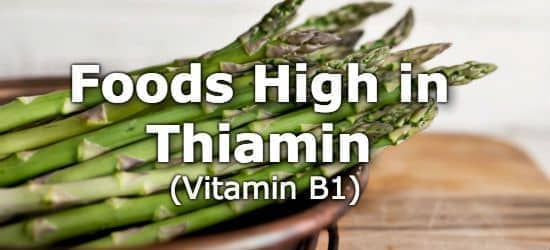
Thiamin (also known as thiamine or vitamin B1) is an essential nutrient required by the body for maintaining cellular function and metabolism. Consequently, it's crucial for the function of a wide array of organs, including the brain. (1)
While rare, a deficiency of thiamin leads to widespread degeneration of the body, particularly the nervous and circulatory systems. (2,3)
A deficiency of thiamin is known as beriberi. One specific type affects primarily the central nervous system, and is known as Wernicke-Korsakoff syndrome. Besides the nervous system, beriberi can also have a severe impact on the cardiovascular system, along with other body systems. (2) Worldwide, beriberi is most common in places where non-enriched white rice or other refined grains make up a large part of the diet. (3)
Over-consumption of thiamin is unknown and at least one study shows that amounts taken well in excess of the daily value (DV) may actually enhance brain functioning. (4) In fact, it appears that thiamin supplements may help to prevent Alzheimer's disease, although more research is needed in this area. (5,6)
Foods high in thiamin include pork, fish, seeds, nuts, beans, green peas, tofu, brown rice, squash, asparagus, and seafood. The current daily value (DV) for vitamin B1 is 1.2mg. (7)
Below is a list of high thiamin foods ranked by a common serving size. Use the nutrient ranking of all foods high in thiamin to sort by nutrient density (100-gram serving size).
Looking for more foods high in B Vitamins? Click here for other vitamin B foods.
List of High Thiamin Foods
-
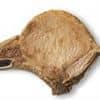 1. Lean Pork Chops + Add
1. Lean Pork Chops + Add
Thiamin
in a 6oz ChopThiamin
per 100gThiamin
per 200 Calories1.1mg
(96% DV)0.7mg
(56% DV)0.7mg
(58% DV)More Pork Products High in Thiamin
- 96% DV in 1 cup of cured ham
- 69% DV in 3oz of pork tenderloin
- 66% DV in 3oz of salami
See all meats high in thiamin.
-
 2. Fish (Salmon) + Add
2. Fish (Salmon) + Add
Thiamin
per 6oz FilletThiamin
per 100gThiamin
per 200 Calories0.6mg
(48% DV)0.3mg
(28% DV)0.3mg
(28% DV)More Fish High in Thiamin
- 39% DV in a 6oz tuna fillet
- 33% DV in a 3oz trout fillet
- 27% DV in a 5oz catfish fillet
See all fish high in thiamin.
-
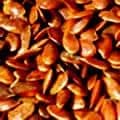 3. Flax Seeds + Add
3. Flax Seeds + Add
Thiamin
per OzThiamin
per 100gThiamin
per 200 Calories0.5mg
(39% DV)1.6mg
(137% DV)0.6mg
(51% DV)More Nuts and Seeds High in Thiamin
- 35% DV in 1oz of sunflower seeds
- 28% DV in 1oz of macadamia nuts
- 21% DV in 1oz of pistachios
See all nuts and seeds high in thiamin.
-
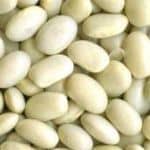 4. Navy Beans + Add
4. Navy Beans + Add
Thiamin
per CupThiamin
per 100gThiamin
per 200 Calories0.4mg
(36% DV)0.2mg
(20% DV)0.3mg
(28% DV)More Beans High in Thiamin
- 35% DV in 1 cup of black beans
- 29% DV in 1 cup of black-eyed peas
- 28% DV in 1 cup of lentils
See all beans high in thiamin.
-
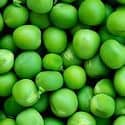 5. Green Peas + Add
5. Green Peas + Add
Thiamin
per Cup CookedThiamin
per 100gThiamin
per 200 Calories0.4mg
(35% DV)0.3mg
(22% DV)0.6mg
(51% DV)See all vegetables high in thiamin.
-
 6. Firm Tofu + Add
6. Firm Tofu + Add
Thiamin
per CupThiamin
per 100gThiamin
per 200 Calories0.4mg
(33% DV)0.2mg
(13% DV)0.2mg
(18% DV)More Soy Foods High in Thiamin
- 39% DV in 1 cup of cooked green soybeans
- 62% DV in a 16oz glass of soymilk
- 11% DV in 1 cup of tempeh
-
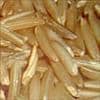 7. Brown Rice + Add
7. Brown Rice + Add
Thiamin
per CupThiamin
per 100gThiamin
per 200 Calories0.4mg
(30% DV)0.2mg
(15% DV)0.3mg
(24% DV)More Whole Grains High in Thiamin
- 21% DV in 2 slices of whole wheat bread
- 20% DV in 1 cup of cooked cornmeal (grits)
- 17% DV in 1 cup of quinoa
- 15% DV in 1 cup of oatmeal
See all grains high in thiamin.
-
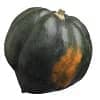 8. Acorn Squash + Add
8. Acorn Squash + Add
Thiamin
per Cup CookedThiamin
per 100gThiamin
per 200 Calories0.3mg
(29% DV)0.2mg
(14% DV)0.6mg
(50% DV)See all vegetables high in thiamin.
-
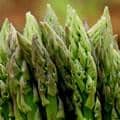 9. Asparagus + Add
9. Asparagus + Add
Thiamin
per Cup CookedThiamin
per 100gThiamin
per 200 Calories0.3mg
(24% DV)0.2mg
(14% DV)1.5mg
(123% DV)See all vegetables high in thiamin.
-
 10. Mussels + Add
10. Mussels + Add
Thiamin
per 3ozThiamin
per 100gThiamin
per 200 Calories0.3mg
(21% DV)0.3mg
(25% DV)0.3mg
(29% DV)More Seafood High in Thiamin
- 24% DV in 20 small clams
- 16% DV in 3oz of abalone (sea snails)
- 9% DV in 3oz of oysters
Printable One Page Sheet
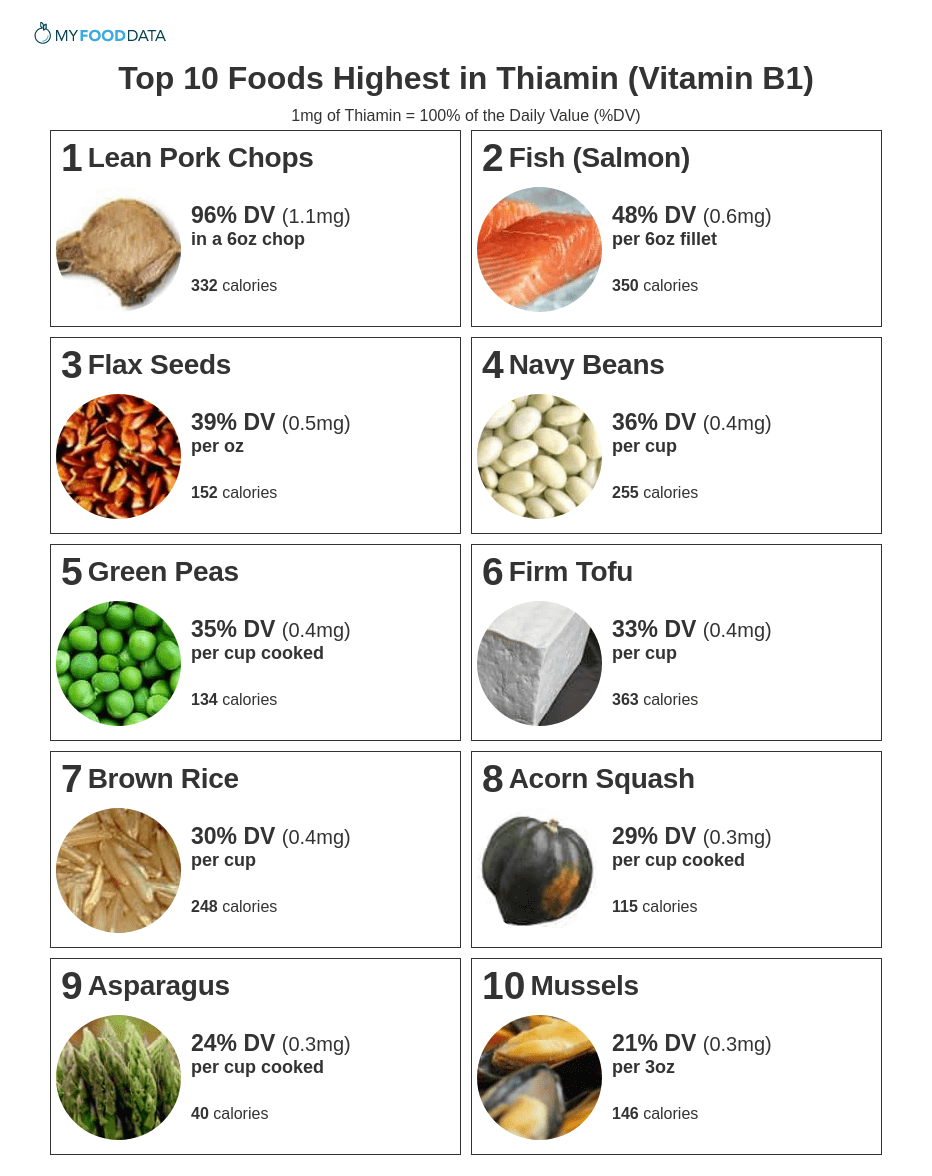
Thiamin (B1) Requirements By Age and Gender
The recommended daily allowance (RDA) for thiamin (Vitamin B1) ranges from 0.5mg to 1.4mg per day. The daily value for vitamin B1 is 1.2mg per day. (7)
| Life Stage | RDA |
|---|---|
| Infants* | |
| 0-6 months old | 0.2mg |
| 7-12 months old | 0.3mg |
| Children | |
| 1-3 years old | 0.5mg |
| 4-8 years old | 0.6mg |
| Males | |
| 9-13 years old | 0.9mg |
| 14-18 years old | 1.2mg |
| 19-50 years old | 1.2mg |
| 50+ years old | 1.2mg |
| Females | |
| 9-13 years old | 0.9mg |
| 14-18 years old | 1mg |
| 19-50 years old | 1.1mg |
| 50+ years old | 1.1mg |
| Pregnancy | |
| 14-18 years old | 1.4mg |
| 18+ years old | 1.4mg |
| Lactation | |
| 14-18 years old | 1.2mg |
| 18+ years old | 1.2mg |
Source: Dietary Reference Intakes for Thiamin.
Other Vitamin B Foods
From the Nutrient Ranking Tool
Use the ranking tool links below to select foods and create your own food list to share or print.
- Foods High in Thiamin (B1)
- Foods Low in Thiamin (B1)
- Vegetables High in Thiamin (B1)
- Fruits High in Thiamin (B1)
- Vegetarian Foods High in Thiamin (B1)
- Nuts High in Thiamin (B1)
- Grains High in Thiamin (B1)
- Beans High in Thiamin (B1)
- Dairy High in Thiamin (B1)
- Breakfast Cereals High in Thiamin (B1)
- Fast Foods High in Thiamin (B1)
View more nutrients with the nutrient ranking tool, or see ratios with the nutrient ratio tool.
Related
Data Sources and References
- The importance of thiamine (vitamin B1) in humans
- Shible AA, Ramadurai D, Gergen D, Reynolds PM. Vitamin B1 (Thiamine) Deficiency Am J Case Rep. 2019 Mar 13;20:330-334. doi: 10.12659/AJCR.914051. 30862772
- Shible AA, Ramadurai D, Gergen D, Reynolds PM. Thiamine deficiency disorders: a clinical perspective Am J Case Rep. 2019 Mar 13;20:330-334. doi: 10.12659/AJCR.914051. 30862772
- Benton D, Fordy J, Haller J. Thiamine supplementation mood and cognitive functioning Psychopharmacology (Berl). 1995 Feb;117(3):298-305. doi: 10.1007/BF02246104. 7770605
- Chen Z, Zhong C. Supplemental thiamine as a practical, potential way to prevent Alzheimer's disease from commencing Prog Neurobiol. 2013 Sep;108:21-43. doi: 10.1016/j.pneurobio.2013.06.004. Epub 2013 Jul 11. 23850509
- Vignisse J, Sambon M, Gorlova A, Pavlov D, Caron N, Malgrange B, Shevtsova E, Svistunov A, Anthony DC, Markova N, Bazhenova N, Coumans B, Lakaye B, Wins P, Strekalova T, Bettendorff L. Neuroprotective Effects of Thiamine and Precursors with Higher Bioavailability: Focus on Benfotiamine and Dibenzoylthiamine Mol Cell Neurosci. 2017 Jul;82:126-136. doi: 10.1016/j.mcn.2017.05.005. Epub 2017 May 12. 28506637
- U.S.FDA - Daily Value on the New Nutrition and Supplement Facts Labels
- Office of Dietary Supplements on Thiamin
Simplify Nutrition Tracking with MyFoodData!
Speedy Tools and Detailed Data FREEEasily analyze your meals to find the best foods for your goals.
✅ Use our recipe nutrition calculator and nutrition comparison tool.
✅ Access expert nutrition data tools and in-depth articles.
✅ Log foods and organize your recipes with a free account.


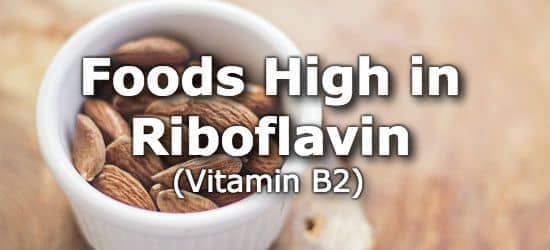 Next ➞
Next ➞
